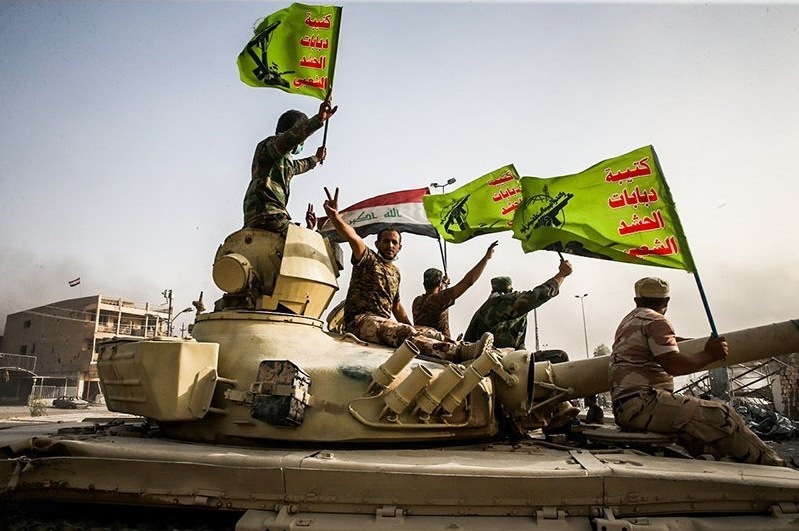Maximum Pressure Still Won’t Sway Iran
The aggressive U.S. strategy has raised tensions in Iraq without creating prospects for a resolution.

Published by The Lawfare Institute
in Cooperation With

As Americans focus their attention on the rapid spread of the coronavirus throughout the country, the Trump administration is grappling with how best to respond to another crisis of its own making abroad. Iranian-backed militias in Iraq, clearly undeterred by the threat of U.S. force, have increased their anti-American activities in recent months by launching sporadic rocket attacks against Iraqi bases where U.S. and allied forces are stationed. Tehran’s primary objective is to force the United States to withdraw its forces from Iraq, as Iraqi Shiite militias and their Iranian sponsors pledged to do following the killing of their respective leaders, Abu Mahdi al-Muhandis and Gen. Qassem Soleimani.
The New York Times reported last month that two camps within the administration are battling out how to respond to these developments, with one camp (led by Secretary of State Mike Pompeo and National Security Adviser Robert O’Brien) trying to convince the president to act more forcefully against these groups and the other (mostly composed of U.S. military and Department of Defense officials, including Secretary of Defense Mark Esper and the Chairman of the Joint Chiefs of Staff Mark Milley) pushing back and advising restraint. If the first camp prevails in the internal debate, it could not only have disastrous implications for U.S. policy vis-a-vis Iran but also undo hard-fought progress made in Iraq and have a lasting impact on America’s ability to work by, with and through partner nation forces in the future.
The camp arguing for a muscular response to Iran’s proxies in Iraq sees the Islamic Republic as particularly vulnerable now while it is being devastated by the spread of the coronavirus within the country and among its leadership and military. To be sure, Iran has been particularly hard hit by the pandemic and has become one of the epicenters of the disease. But the line of thinking that more pressure will bring Iran to its knees has thus far produced nothing but precisely more of the type of Iranian actions the United States wishes to limit or end. Indeed, since President Trump withdrew from the Joint Comprehensive Plan of Action in 2018, Tehran has resumed nuclear activities previously restricted by the agreement and Iranian-backed militias in Iraq have grown more assertive. Facing this reality, Pompeo and those supporting his approach inside and outside of the government have continuously called for more pressure, arguing that the regime is precarious and will fold with just slightly more pressure. In doing so, they’ve created the very quagmire the administration is currently trying to fix with a much shorter menu of options, none of which is particularly appealing.
Having eliminated all off-ramps, the United States presently faces a heightened threat from Iran’s proxies in Iraq, with U.S. military personnel, diplomats and citizens in the region at risk. Now, the architects of the pressure campaign are seeking to ratchet up U.S. pressure against Iran in Iraq. But this approach is myopic. Going after Iraqi militias will no doubt have some benefits, but many of these benefits will be overshadowed by the costs of such an approach.
By turning its attention to Iran in Iraq, the United States would be diverting critical resources from Operation Inherent Resolve, its current counter-Islamic State mission (to which some 80 nations have signed up), in addition to stymying the advise-and-assist mission in Iraq. And while many of these countries are troubled by Iran’s actions, they did not commit their own blood and treasure to stabilizing Iraq just to see their efforts squandered by the administration’s tensions with Iran (which many members of the counter-Islamic State coalition see as the result of Trump’s Iran policy to begin with). The goal of U.S. efforts to build partner capacity and cooperate with the Iraqi government on security is to create a competent and capable partner able to tackle future threats, such as a resurgent Islamic State, but also to allay any concern or doubt among U.S. partners and allies as to whether they should join Washington in future efforts. Concerns over the coronavirus have also led U.S. forces to withdraw troops from Iraq, further attenuating an already dwindling force that could soon be asked to do more with less.
The U.S. record in Iraq and the broader region has been one characterized by an inchoate mission set and contradictory policy, which has jeopardized operations and made the U.S. appear as an unreliable partner. After 9/11, many nations joined the United States to defeat the terrorist threat posed by al-Qaeda and its affiliates and to create a stable Afghanistan, where such groups could no longer operate with impunity. These countries followed the U.S. lead knowing that Washington would keep up its word and focus on its mission. By moving the goalposts on its partners, the United States would erode the modicum of credibility it has left with its allies and partners and ensure that the next time it needs them to fight a common foe, they will think twice before offering their support to the cause.
Finally, there are more immediate costs to be considered, including these militias’ ability to target U.S. forces and assets in Iraq and potentially even conduct operations outside of Iraq—and all this against the backdrop of a global pandemic. Here, too, U.S. allies won’t be isolated from the blowback, as recent rocket attacks leading to the death to three U.S. and British military personnel demonstrate. Iranian-backed militias are also operating even more covertly than in the past, further complicating the potential for a proportionate and effective U.S. response.
The best and most sustainable way for the United States to ensure these proxies aren’t a threat is to create a strong government in Iraq. This will require continuing to help build Iraqi political institutions and provide support for nonsectarian political leaders—not taking more aggressive action. This restraint is critical even as it appears that limited and targeted action to respond to these groups will be necessary, especially as Iran and its allies continue to react to the killing of Soleimani. The United States should respond in kind to proxy attacks in a measured fashion while eschewing disproportionate strikes against the Iranian regime and its leadership that might appease anti-regime hardliners in the United States without achieving tangible gains in security for Iraq or U.S. troops currently stationed there.
If the maximum pressure camp gets its way, the likely result will be a continued cycle of violence, leading to more of the same—a tit-for-tat escalation that the United States is less prepared to deal with than at any point in recent memory, and an emboldened Iran that will use the fight against the United States to rebuild its image domestically while consolidating power in neighboring Iraq.






